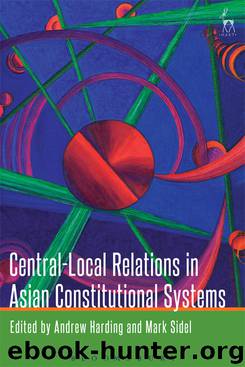Central-Local Relations in Asian Constitutional Systems by Sidel Mark Harding Andrew

Author:Sidel, Mark,Harding, Andrew
Language: eng
Format: epub
Publisher: Bloomsbury UK
Published: 2015-03-15T00:00:00+00:00
5
Central-local Relations in Indonesia: Reforming the Integralist State
SIMON BUTT
INTRODUCTION
IN MAY 1998, Indonesia’s President Soeharto stepped aside amidst economic calamity and violent unrest across the country. Soeharto’s immediate successor, Bacharuddin Jusuf Habibie, ordered fresh elections for the following year. Not since 1955 had free and fair elections been held in Indonesia and had the national parliament been comprised largely of democratically elected members.
These parliamentarians found themselves under great pressure to meet demands for change that had emerged during Soeharto’s rule and had precipitated his fall.1 There were fears that if these reforms were not made, or if they were made but were not genuine, then Indonesia might descend into violent unrest or even ‘Balkanise’.2 In any event, most of these lawmakers strongly supported reform, with many of them formerly being in opposition, from where they criticised elements of the authoritarian system they were now in a position to replace. Even former members of Soeharto’s New Order elite who were re-elected to the new parliament recognised that they needed to support key reforms in order to avoid further unrest and to ‘save themselves’.3 Many of the reformist demands were met quickly, at least on paper, with a large swathe of statutory and constitutional enactments made to dismantle key components of authoritarianism.
One of the most important of these reforms was ‘regional autonomy’ (otonomi daerah) or decentralisation, under which local governments were given extensive powers to govern their own affairs, including by issuing by-laws, commonly referred to as Perda (Peraturan Daerah, usually translated as ‘regional regulation’ or ‘regional regulations’). Regional autonomy was important not only because of the anticipated improvements in standards of governance that were expected from it, but also because it helped assuage increasing resentment towards the strongly-centralised system established during the Soeharto period. Different regions had expressed different grievances. Some complained that central government control was excessively interfering and paternalistic. During the Soeharto period, the primary function of local governments had been to follow national policies and directives, with very little latitude given to the regions to govern their own affairs. Other regions, such as Aceh, Kalimantan and Papua, complained that the central Government was predatory, or at least exploitative, directing to itself the lion’s share of the spoils from the exploitation of natural resources located in their provinces.4 Despite their rich reserves of natural resources such as forests, minerals or fossil fuel, many of these ‘outer’ regions of Indonesia remained amongst Indonesia’s most un- or under-developed. Yet other regions objected to central government control on ethnic or cultural grounds, complaining that the central Government was Java-centric and comprised primarily of moderate Muslims, and failed to respect ideological, cultural or religious differences. Local figures in Aceh, for example, sought a greater role for Islamic law in the province; Papuans and East Timorese, many of whom are Christians and ethnically distinct from many other Indonesians, claimed on historical grounds that they should never have been made part of Indonesia, and only joined as a result of military threats. Even Balinese groups sought to secede on cultural, religious and economic grounds.
Download
This site does not store any files on its server. We only index and link to content provided by other sites. Please contact the content providers to delete copyright contents if any and email us, we'll remove relevant links or contents immediately.
Day by Elie Wiesel(2786)
The Age of Genius by A. C. Grayling(2592)
Gideon's Spies: The Secret History of the Mossad by Gordon Thomas(2356)
The Gulag Archipelago (Vintage Classics) by Aleksandr Solzhenitsyn(2106)
FATWA: Hunted in America by Pamela Geller(2016)
Columbine by Dave Cullen(1870)
Men Explain Things to Me by Rebecca Solnit(1729)
The Rule of Law by Bingham Tom(1703)
Anatomy of Injustice by Raymond Bonner(1671)
Examples & Explanations: Administrative Law by William F. Funk & Richard H. Seamon(1649)
Three Cups of Tea by Greg Mortenson(1621)
The Source by James A. Michener(1619)
That Every Man Be Armed by Stephen P. Halbrook(1586)
ADHD on Trial by Michael Gordon(1583)
Future Design by Unknown(1580)
Gideon's Spies by Gordon Thomas(1512)
Palestinian Walks by Raja Shehadeh(1499)
Constitutional Theory by Carl Schmitt(1458)
Nothing to Envy by Barbara Demick(1451)
